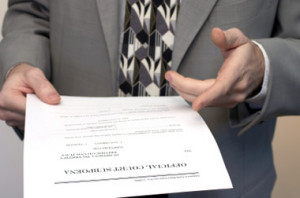 Many legal terms are in Latin, and it can difficult figuring out what they mean. In this case, a subpoena duces tecum is simply a subpoena that orders someone to produce some form of evidence. This is a court summons, and so it has to be obeyed, and it often requires the person to actually appear in court with the evidence that is being requested. The proceedings can be either a hearing, a trial, or a deposition.
Many legal terms are in Latin, and it can difficult figuring out what they mean. In this case, a subpoena duces tecum is simply a subpoena that orders someone to produce some form of evidence. This is a court summons, and so it has to be obeyed, and it often requires the person to actually appear in court with the evidence that is being requested. The proceedings can be either a hearing, a trial, or a deposition.
The subpoena duces tecum is not the same as the subpoena ad testificandum, in which a person is required to come to court to testify orally. With a subpoena duces tecum, the recipient is ordered to bring physical objects such as books, ledgers, computer discs, etc to the court.
In most US jurisdictions, any type of subpoena normally has to be served personally.
It is not uncommon for both types of subpoenas to be issued to the same person. The court may want the evidence but may also want to ask questions about the evidence. Many times, the order to produce evidence is issued prior to any depositions. It is also worth noting, that in some cases, persons cannot be compelled to produce evidence without this subpoena being issued. This would be the case if the person was only a third-party to the action, meaning the person had no direct involvement in the litigation.
One of the main reasons for issuing this type of subpoena is so any evidence collected prior to trial can be used by both sides of the case as discovery evidence. In other words, it gives all of the lawyers time to go through the evidence brought in to see if any of it pertains to their case. This normally takes place in what is called pre-trial discovery.
If the evidence is not produced in a civil case, the court may allow for a continuance. The person who was required to produce the evidence, but did not do so, must show the court good reasons why they failed to do so. There are some acceptable explanations which might include things like destruction of certain papers or simply loss of the objects. Negligence or simply not wanting to bring in the evidence is not an acceptable excuse.
In a criminal case, the continuance may be granted where there are good reasons evidence or documents that pertain to the case cannot be produced at trial. The magistrate or the trial judge will issue the continuance if needed. It should be noted that in some cases, failure to produce the evidence or documents that were subpoenaed by the person who actually has control over those documents, can be seen negatively by the court. In other words, the court may think the person is hiding something because there is something to hide that might adversely affect the person.
If subpoenaed, it is always a good idea to consult with an attorney before doing or saying anything. An attorney can offer expert legal advice that can be very important in how you respond to any legal action you find yourself involved in.





